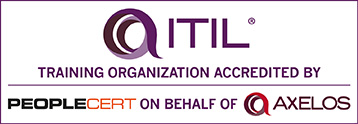This course leads to the ITIL Certificate – Continual Service Improvement. This is a free-standing qualification, but is also part of the ITIL Intermediate Lifecycle stream, and one of the modules that leads to the ITIL Expert Certificate in IT Service Management.
Continual Service Improvement
Out of stock
Description
Continual Service Improvement
This course leads to the ITIL Certificate – Continual Service Improvement. This is a free-standing qualification, but is also part of the ITIL Intermediate Lifecycle stream, and one of the modules that leads to the ITIL Expert Certificate in IT Service Management.
The course covers the management and control of the activities and techniques within the Continual Service Improvement stage, but not the detail of each of the supporting processes.
| Length | 3 days |
| Target group | This course is suitable for individuals who require a detailed understanding of the ITIL Continual Service Improvement phase of the ITIL core Lifecycle and how it may be implemented to enhance the quality of IT service provision within an organisation. |
| Exam | The examination is closed book and made up of multiple choice questions based on a scenario. Students will be allowed 120 minutes to answer the questions. You need at least 70% (28/40 points) to pass. |
| Prerequisites | Candidates wishing to be trained and pass the exam for this qualification must already hold the ITIL Foundation Certificate. |
You’ll learn
Detailed understanding of processes, functions and activities related to Continual Service Improvement within the Service Lifecycle.
- Introduction to CSI
- CSI principles
- CSI process
- CSI methods and techniques
- Organizing for CSI
- Technology considerations
- Implementing CSI
- Challenges, critical success factors and risks
Course content
Introduction to Continual Service Improvement
- The purpose, objectives and scope of CSI
- The value to the business of adopting and implementing CSI
- The context of CSI in the ITIL service lifecycle
- The approach to CSI, including key interfaces and inputs and outputs
Continual Service Improvement principles
- How the success of CSI depends on understanding change in the organization and having clear accountability
- How service level management and knowledge management influence and support CSI
- How the complete Deming Cycle works, and how it can be applied to a real world example
- How CSI can make effective use of the various aspects of service measurement
- What situations require the use of frameworks and models, and examples of how each type can be used to achieve improvement
Continual Service Improvement process
- What the seven-step improvement process is, how each step can be applied and the benefits produced How CSI integrates with the other stages in the ITIL service lifecycle
- How other processes play key roles in the seven-step improvement process
Continual Service Improvement methods and techniques
- When to use assessments, what to assess and how a gap analysis can provide insight into the areas that have room for improvement
- How to use benchmarking, service measurement, metrics, service reporting, including balanced scorecard and SWOT, to support CSI
- How to create a return on investment, establish a business case and measure the benefits achieved
- How techniques within availability management, capacity management, IT service continuity management and problem management can be used by CSI
Organizing for Continual Service Improvement
- The role of the CSI manager, and the roles of service owner, process owner, process manager and process practitioner in the context of CSI and how they can be positioned within an organization
- How to design, implement and populate a RACI (responsible, accountable, consulted, informed) diagram as well as how to use it to support CSI
Technology considerations
- The technology and tools required and how these would be implemented and managed to support CSI activities such as performance, project and portfolio management, as well as service measurement and business intelligence reporting
Implementing Continual Service Improvement
- CSI implementation: strategy, planning, governance, communication, project management, operation, as well as how to deal with cultural and organizational change
Challenges, critical success factors and risks
- The challenges and risks such as staffing, funding, management, etc., which can be related to CSI and the details behind how each challenge can be addressed
- The critical success factors related to CSI as well as how to measure and monitor them
Request Information
Please select your inquiry type below, then fill out the form and we’ll get in touch with you.
Additional information
| City | Stockholm |
|---|---|
| Training Provider | Aim 4 Knowledge |

